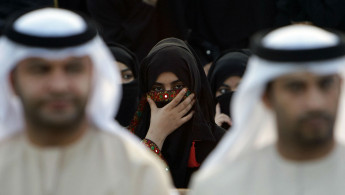Marriage on the rocks in the United Arab Emirates
Despite the government's best attempts to make marriage a union for life, divorce is a growing trend in the UAE. Emiratis are more likely to divorce than any other nationality in the Arab world.
Last year, there was a 6.6 percent increase in the number of divorces in Dubai, according to the Dubai Statistics Centre. The issue has been a frequent topic of discussion on the radio, where on-air presenters have attempted to patch up family rifts and find solutions through dialogue.
Blame game
One of the most popular radio programmes in the UAE is How to deal with marital problems, which aims at spreading awareness, and targets young couples.
Meanwhile, the government has launched family counselling programmes to help tackle the rising rate of divorce, in addition to the Marriage Fund - which aims to promote "family life". Recently, the Marriage Fund conducted a field study to look at the growing tendency of divorce between young married couples.
More than 50 percent of female divorcees blame their husbands for the breakdown of the marriage, while 70 percent of men blamed their former wives, the study found.
This tendency for divorcees to blame their former spouse for the breakdown in their relationship is leading groups such as the Marriage Fund to believe that a lack of dialogue is one of the main reasons why so many marriages fail in the UAE.
The study also showed that a high percentage of Emirati men marry foreign spouses, and a lack of communication or understanding of their partner's culture or language is contributing to their separation. More than 50 percent of marriages between Emirari subjects and non-Emiratis end in divorce.
In another effort by the government to tackle the problem, the department of family development has set up a hotline for couples to discuss domestic issues - although many Emiratis say that the problem is not to do with reconciling with their spouses but that they were not suited to each other in the first place.
Dancing in the dark
Abed, an Emirati subject who recently separated from his wife, says that a major reason for divorce in the UAE is to do with the traditional mode of union in the country - arranged marriages.
"A lack of common interests between married couples is one of the main reasons for divorce," he said. "Your spouse is chosen for you by your family, especially your mother. This is where marital problems begin."
Rashid, also divorced, shares Abed's sentiments. "The majority of divorce cases among Emiratis happen because of arranged marriages," he agreed. "Couples are rarely given the chance to know one another or to develop a level of affinity before they marry."
| There were 784 divorce cases filed in the first six months of 2014, compared with 646 cases a year earlier. |
Rashid said that another reason was that more and more Emiratis are questioning polygamy.
Statistics collected by Dubai courts show that there were 784 divorce cases filed in the first six months of 2014, compared with 646 cases a year earlier. Divorce cases recorded in Dubai alone reached 1,257 cases in 2014.
Despite this, divorce in the UAE remains a taboo in society, which leads to families prying into the lives of wedded couples when they believe that separation might be on the cards.
Badriya says that her family's interference in the relationship made things worse and led to divorce. The domestic dispute evolved into a clash between her family and her husband's.
Now, she says she regrets her decision to marry, but says she felt obliged to follow her parents' wishes.
Um Abbas, a mother of three who is also divorced, said by attempting to "safeguard her dignity", her parents also put further pressure on her that led to a divorce.
"Today, I am but a burden on my parents, as my three children and I live with them. Also, I receive benefits from the ministry of social affairs, in addition to alimony."
Flights of fancy
According to the Dubai court system, some of the recorded divorce cases were filed due to claims of infidelity. As in other parts of the world, many men in the UAE perceive affairs as a passing fancy that would not have an impact on their marriage.
"Things are usually unchanged in a relationship when the cheating is done by the man. However, the infidelity of a women is considered an unforgivable crime," said Jawahir, another divorcee.
"Affairs outside of marriage are acceptable to some, but they may cause a rift that reshapes their daily struggles and negatively impact their lives and those of their children."
For some, divorce has become a convenient and easy escape route from domestic problems, particularly when marriages are arranged by families and not built on solid foundations of communication and respect.
The ministry of social affairs has issued licences to civil offices to act as marriage registrars, in order to make it easier for young couples to wed.
But many conservative elements in Emirati society criticised the emergence of registrars, saying it was an attack on their traditions.
Still, many others say it is unsuitable matchmaking and the inevitable divorces that are the biggest threats to the stability of the family unit in the UAE.
This article is an edited translation from our Arabic edition.



